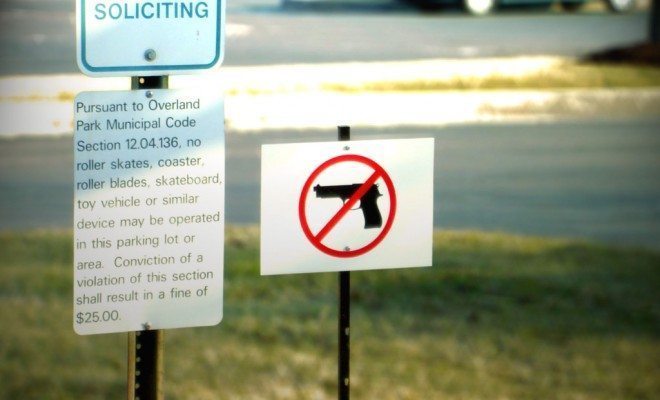 Image courtesy of [Tim Samoff via Flickr]
Image courtesy of [Tim Samoff via Flickr]
Law
We Need to Stop Sensationalizing Gun Self Defense
Last Sunday, an armed citizen named Patrick Ewing shot and injured a man who had drawn his weapon and fired at civilians. The story did not get a lot of media attention, but the coverage it did receive sensationalized the event, focusing on Ewing’s concealed carry permit. Some gun rights activists and conservative news sources dramatized and championed the what happened as proof of the benefit of concealed carry permits. Unfortunately, this event, like certain other gun-related incidents, was given disproportionate attention and used to defend simplistic approaches to gun laws.
According to police, 62-year-old Thomas McCary was engaged in an argument with a woman when Patrick Ewing, her brother, approached to check on the situation. McCary then pulled out a .38-caliber handgun and fired three shots. Ewing then drew his own weapon and fired three shots back, hitting McCary once in the leg. After retreating into his house and grabbing another gun, McCary returned and began shooting at the woman he was arguing with, as well as her one-year old son and a third man. Ewing fired more rounds at McCary in order to divert his attention while the others retreated into their home.
While Ewing’s actions almost certainly saved lives, arguing that more people should carry guns in public is far too simplistic. Neither shooter proved very effective with their weapon, with Ewing only hitting McCary once in the leg. People often imagine that licensed gun carriers can effectively defend themselves and the people around them, but the reality is that such accuracy is difficult and guns are not often used in self-defense. The use of weapons in dangerous situations, even by well-meaning citizens, is complex and potentially dangerous.
This exaggerated emphasis on a single event is also often true of those who support stronger gun control laws. Events such as the recent theater shooting in Louisiana have prompted politicians to again talk about the issue of gun control–a recurring response to mass shootings. Despite the well-intentioned rhetoric, these calls to action by politicians also rarely result in substantive change. When such events are no longer in the headlines, politicians are content with moving on to other issues. While mass shootings invoke media attention, they account for less than one percent of gun murders, meaning these events may not be the best basis to determine gun policy.
Sadly, most Americans are desensitized to mass shootings and the gun control rhetoric that follows. Instances of heroic gun-toting civilians are not very common, which is why these stories can resonate so strongly, but also why they should not be used as evidence of the norm. For issues like guns and gun violence, it is important to rely on facts instead of anecdotal evidence.
There is evidence on both sides of the debate over the relationship between gun ownership and crime. Some evidence suggests that increased access to guns, especially through concealed carry permits, reduces gun violence. These studies conclude that high gun ownership leads to decreases in crime and that gun laws have been ineffective at stopping criminals from getting access to guns. On the other hand, there is evidence that counters these conclusions. The correlation between gun ownership rates and gun deaths in the United States, as well as large loopholes in current gun laws, point to the need for stricter gun control. Also, one NIH study found that guns being used in self-defense are not very common, with only one instance of self-defense per seven assaults, eleven suicide attempts, and four accidents involving guns.
The fact of the matter is this: the jury is out on the effect of gun ownership on gun violence. It also important to remember that although it is certainly an important factor, the prevalence of gun ownership is not the only issue to consider. Mental health treatment, increased gun training, and community-based violence prevention initiatives are all important avenues to explore. These solutions, which take a more comprehensive approach to the issue of gun violence, are more likely to be effective than gun restrictions alone.
Too often, the activists and biased media–on either side of the issue–can sensationalize certain events. And while blaming media coverage for motivating mass shooters is not supported by data, there is something to be said for the media’s effect on the general public. Despite dramatic decreases in crime over the past few decades, the public’s perception of crime is that it is either increasing or stagnant. This is at least partially due to the sensationalization of crime, as well as new media’s ability to cover more stories. There are, however, responsible sources that try to look at the whole picture when it comes to the debate over gun control and it is crucial for citizens to do their best to remain properly informed. In order to foster a productive conversation about gun control, the discussion must be driven by facts, instead of the sensationalized events that fit into each side’s rhetoric.








Comments